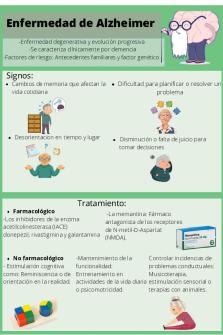Alzheimer - relatation PDF

| Title | Alzheimer - relatation |
|---|---|
| Course | Psicologia Infantil |
| Institution | Universidade Federal de Pernambuco |
| Pages | 3 |
| File Size | 72.4 KB |
| File Type | |
| Total Downloads | 27 |
| Total Views | 159 |
Summary
Download Alzheimer - relatation PDF
Description
Patient: Alzheimer's plan OK, but too late for me When Phil Kreitner’s wife Sherril Gelmon comes home and asks what he did all day, he has to pause to think. It’s hard enough to remember what he did five minutes ago. And where he keeps the different cereals he likes to mix in the morning.
Kreitner, 72, of Portland, Oregon, is one of many aging Americans living with mild cognitive impairment, a condition marked by memory impairment that may progress into the more severe Alzheimer’s disease. He’s participating in a clinical trial aimed at testing a treatment for dementia, and believes furthering research is critical for combating the brain disease.
"I walk around all [expletive] day telling myself 'Why can’t you remember that? You’ve got to remember that! Why aren’t you remembering that? How can you try to remember that?' ” says Kreitner, who was the subject of a CNN profile in 2011.
He’s excited that the Obama administration has committed to investing in more clinical trials for Alzheimer’s disease, with the goal of effective treatment and prevention by 2025. But when that deadline arrives, Kreitner isn't sure he'll still be around - he may not live to see the benefits of that research.
The government’s new strategy, outlined Tuesday, supports a $7.9 million dollar study on an insulin nasal spray treatment. Separately, researchers will work on the first-ever Alzheimer's prevention trial in people with a genetic predisposition to develop the condition. The plan also offers solutions for collaborating across federal and state agencies and for informing the public through a one-stop website, www.alzheimers.gov.
“We’ve put tremendous resources into the conventional diseases, the ones that have clear pathogens,” Kreitner said. “But on the conditions attacking the brain, we have made not much progress.”
Insulin may help treat Alzheimer’s
Help can’t come soon enough for the more than 5 million people in the United States living with Alzheimer’s. Take a look at these disturbing Alzheimer's statistics projected for 2050:
• 11 million additional people will have the condition in the United States • 115.4 million will have it worldwide, compared to the current figure of about 35.6 million • $1.1 trillion will be spent in the U.S. on caregiving costs, compared with $200 billion this year.
Staring in the face of these sobering numbers, the Obama administration offered details Tuesday of how it plans to take on this mysterious disease that destroys the brain.
The new strategy supports a $7.9 million dollar study on an insulin nasal spray treatment. Separately, researchers will work on the first-ever Alzheimer's prevention trial in people with a genetic predisposition to develop the condition. The strategy also offers solutions for collaborating across federal and state agencies and for informing the public through a one-stop website, www.alzheimers.gov.
"The plan gives us a blueprint to build on our research efforts," U.S. Secretary of Health and Human Services Kathleen Sebelius said Tuesday at the announcement of the government's new plan. "These actions are the cornerstone of an ambitious and aggressive agenda."
Dr. Francis Collins, director of the National Institutes of Health, said at the announcement that, scientifically speaking, we are in an "exceptional moment" with Alzheimer's, with more "revelations" coming out all the time.
Alzheimer's currently affects more than 5 million Americans.
Health officials detailed the new plan Tuesday at the Alzheimer’s Disease Research Summit 2012: Path to Treatment and Prevention. Leading Alzheimer's researchers from around the world are at the National Institutes of Health today to talk about which research should be emphasized.
President Obama signed the National Alzheimer’s Project Act into law in January 2011, which called for a coordinated national plan to fight Alzheimer's. In February of 2012, the administration said it would push for a $156 million increase in funding for Alzheimer's research over the next two years. That's in addition to the $450 million already being spent. As of Tuesday, Obama's proposed 2013 budget allows for a $100 million increase for antiAlzheimer's efforts, which is part of the $156 million. The other part is for 2012.
Still, funding for Alzheimer's research in the United States has not even approached the level of monetary support for other major diseases. Last year, the NIH spent $3 billion on research into AIDS, $4.3 billion on heart disease, and $5.8 billion for cancer, according to the Alzheimer's Association.
Photo gallery: Alzheimer's disease
The current thinking among Alzheimer's experts is that early detection and intervention – even before symptoms begin – is better. Individuals with only mild memory problems may hold the most promise for testing treatments. Scientists know that beta-amyloid plaques in the brain are associated with Alzheimer's disease, but they are not necessarily a precursor to it. Still, MRI and PET scans can detect these plaques and, combined with mild memory problems, there's a high likelihood of developing full-blown Alzheimer's.
There's also a rare form of Alzheimer's that is genetically driven.
Funding is only one part of finding solutions for this debilitating disease. In practice scientists find it challenging to get a lot of participation in clinical trials. Some people don't want to risk the possible side effects of an experimental drug; others do want to try new drugs, but fear being placed in the placebo group. And elderly people may have practical difficulties getting to the study location.
While Kreitner's father, who had Alzheimer’s, died just shy of 80, and rarely admitted he had memory problems. Kreitner, on the other hand, says he has accepted his own difficulties.
“I’m sure there’s going to be improvement [in research], but the resources need to go into it,” Kreitner said.
Post by: Elizabeth Landau - CNN.com Health Writer/Produce...
Similar Free PDFs

Alzheimer - relatation
- 3 Pages

ASKEP ALZHEIMER
- 11 Pages

Alzheimer - PLACE
- 4 Pages

MAKALAH ALZHEIMER
- 21 Pages

Pathoraster Alzheimer Demenz
- 8 Pages

Paper alzheimer resumen
- 1 Pages

Mapa Conceptual Alzheimer
- 1 Pages

Fonoaudiología y Alzheimer
- 12 Pages

Alzheimer historia natural
- 3 Pages
Popular Institutions
- Tinajero National High School - Annex
- Politeknik Caltex Riau
- Yokohama City University
- SGT University
- University of Al-Qadisiyah
- Divine Word College of Vigan
- Techniek College Rotterdam
- Universidade de Santiago
- Universiti Teknologi MARA Cawangan Johor Kampus Pasir Gudang
- Poltekkes Kemenkes Yogyakarta
- Baguio City National High School
- Colegio san marcos
- preparatoria uno
- Centro de Bachillerato Tecnológico Industrial y de Servicios No. 107
- Dalian Maritime University
- Quang Trung Secondary School
- Colegio Tecnológico en Informática
- Corporación Regional de Educación Superior
- Grupo CEDVA
- Dar Al Uloom University
- Centro de Estudios Preuniversitarios de la Universidad Nacional de Ingeniería
- 上智大学
- Aakash International School, Nuna Majara
- San Felipe Neri Catholic School
- Kang Chiao International School - New Taipei City
- Misamis Occidental National High School
- Institución Educativa Escuela Normal Juan Ladrilleros
- Kolehiyo ng Pantukan
- Batanes State College
- Instituto Continental
- Sekolah Menengah Kejuruan Kesehatan Kaltara (Tarakan)
- Colegio de La Inmaculada Concepcion - Cebu






